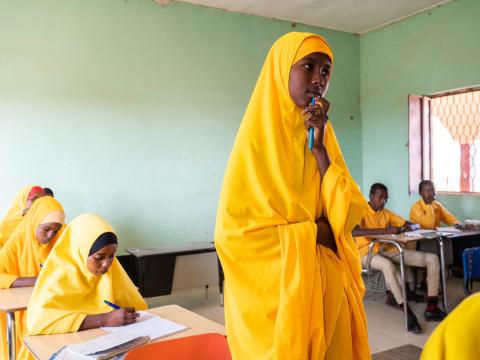Ending Harmful Practices through Channels of Hope

Hawa is a 14-year-old student. Since she was younger, she has been hearing about Female Genital Mutilation/Cutting (FGM/C), which is a common practice in Somalia.
"I heard about FGM/C when I was seven years old. I used to be terrified of FGM/C when I heard its long-term health consequences", she narrates.
Like Hawa, many young girls are terrified by FGM/C in Somalia. It is estimated that 90% of the female population aged between 15 to 49 has undergone FGM/C in Somalia, and 65% of this population supports the continuation of this practice. This despite the sad fact that FGM/C can lead to various types of complications, both medical and psychological.

According to Abdirizak Hassan Farah, the Acting Director-General of the Ministry of Justice, Constitution, Religious Affairs and Rehabilitation in Puntland, FGM/C is deeply anchored in culture: "If a girl is uncircumcised, she wouldn't freely participate in the family and community activities. As an example, she can't slaughter a goat or a sheep as they believe that it's not halal for the livestock she had slaughtered." Traditionally, community elders and faith leaders used to encourage the FGM/C practices.
Based on this assessment, World Vision, with support from the Finnish Government, is working in conjunction with local authorities and has put in place a multi-sectoral programme that aims at reducing FGM/C among the Somali population. One of the key elements of this programme is the Channels of Hope (CoH) approach, which aims at training and sensitising community leaders, such as faith leaders about the dangers of FGM/C.

CoH is one way that mobilises community leaders—especially faith leaders-- to respond to core issues affecting their communities—such as maternal and child health, gender equity and gender-based violence, and child protection. Faith leaders trained on the CoH approach become active participants in their communities and are committed to identify and support the most vulnerable in their communities. They also mobilise their own congregations and seek to strengthen existing community structures.
"World Vision is our big partner, and it helps us through a programme whereby the faith leaders have to orient the community towards the endless problems of FGM/C," says Abdirizak Hassan Farah.
Said Mohamud Osman is a member of the faith committee in Diilin village. Like many people in his country, he was brought up in a society considering FGM/C to be a positive practice. Since the Ministry of Justice, Constitution, Religious Affairs and Rehabilitation have created awareness with the support of faith leaders through CoH, more people are beginning to understand the effects of FGM/C practice.

"Literally, we heard that FGM/C is an old traditional practice." Now, the faith leaders are advocating for the end of the practice among the community”, Osman shares.
According to Mohamed Abdirisak Nuh, the General Director of the Ministry of Women Empowerment and Family Affairs in Puntland, World Vision has played a key role working together with the ministry in reaching remote areas to create awareness where the practice is high.
Hawa is convinced that if the awareness continues, in the future, people will stop FGM/C.
World Vision supports children like Hawa by promoting awareness activities, equipping schools and providing learning materials to Somali children living in the most vulnerable places. So far, the programme has reached 2,156 pupils (990 boys and 1166 girls) with FGM/C awareness messages.